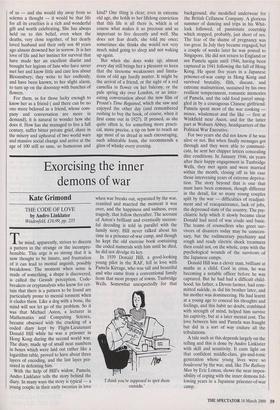Exorcising the inner demons of war
Kate Grimond
THE CODE OF LOVE by Andro Linklater Weidenfeld, £16.99, pp. 235 he mind, apparently, strives to discern a pattern in the strange or the incompre- hensible. This urge is so strong that it is now thought to be innate, and frustration of it can lead to mental anguish, possibly breakdown. The moment when sense is made of something, a shape is discovered, is called the Gestalt perception. Code- breakers or cryptanalysts who know for cer- tain that there is a pattern to be found are particularly prone to mental torment when it eludes them. Like a dog with a bone, the mind will not let go of the problem. So it was that Michael Aston, a lecturer in Mathematics and Computing Science, became obsessed with the cracking of a coded diary kept by Flight-Lieutenant Donald Hill while he was a prisoner in Hong Kong during the second world war. The diary, made up of small neat numbers in boxes which were laid out rather like a logarithm table, proved to have about three layers of encoding, and the last layer per- sisted in defeating him. With the help of Hill's widow, Pamela, Andro Linidater tells the story behind the diary. In many ways the story is typical — a young couple in their early twenties in love when war breaks out, separated by the war, reunited and married the moment it was over, and the happiness and sadness, even tragedy, that follow thereafter. The account of Aston's brilliant and eventually success- ful decoding is told in parallel with the family story. Hill never talked about his time in a prisoner-of-war camp, and though he kept the old exercise book containing the coded numerals with him until he died, he did not divulge its key.
In 1939 Donald Hill, a good-looking young pilot in the RAF, fell in love with Pamela Kirrage, who was tall and beautiful and who came from a conventional family from that most proper of towns, Tunbridge Wells. Somewhat unexpectedly for that think you're supposed to spot them outside.' background, she modelled underwear for the British Cellanese Company. A glorious summer of dancing and trips in his Whit- lock followed, of passionate courtship which stopped, probably, just short of sex. The fear of the shame of pregnancy was too great. In July they became engaged, but a couple of weeks later he was posted to Singapore. He did not return to England or see Pamela again until 1946, having been captured in 1941 following the fall of Hong Kong. He spent five years in a Japanese prisoner-of-war camp in Hong Kong and survived brutality, filth, disease, and extreme malnutrition, sustained by his own resilient temperament, romantic memories of Pamela, and the odd food parcel smug- gled in by a courageous Chinese girlfriend. Pamela spent most of the war cooking mince, whalemeat and the like — first at Winkfield near Ascot, and for the latter part at Woburn Abbey, headquarters of the Political War Executive.
For two years she did not know if he was alive or not. But when finally messages got through and they were able to communi- cate, he sent her chipper letters concealing dire conditions. In January 1946, six years after their happy engagement in Tunbridge Wells, they met again and were married within the month, closing off in his case those intervening years of extreme depriva- tion. The story beyond that is one that must have been common, though different in the detail, for so many young couples split by the war — difficulties of readjust- ment and of reacquaintance, lack of jobs, the depressed state of the country. The psy- chiatric help which it slowly became clear Donald had need of was crude and basic. The teams of counsellors who greet sur- vivors of disasters today may be unneces- sary, but the rudimentary psychiatry and rough and ready electric shock treatment then could not, on the whole, cope with the psychological wounds of the survivors of the Japanese camps.
Donald Hill was a clever man, brilliant at maths as a child. Cool in crisis, he was becoming a notable officer before he was captured. But he had had a difficult child- hood; his father, a Devon farmer, had com- mitted suicide, as did his brother later, and his mother was domineering. He had learnt at a young age to conceal his thoughts and feelings, and this habit no doubt, combined with strength of mind, helped him survive his captivity, but at a later mental cost. The love between him and Pamela was fraught but did in a sort of way endure all the tribulations.
A tale such as this depends largely on the telling and this is done by Andro Linldater with skill and sensitivity. It casts light on that confident middle-class, gin-and-tonic generation whose young lives were so bouleverse by the war, and, like The Railway Man by Eric Lomax, shows the near impos- sibility of coping with the inner demons fol- lowing years in a Japanese prisoner-of-war camp.


















































































 Previous page
Previous page